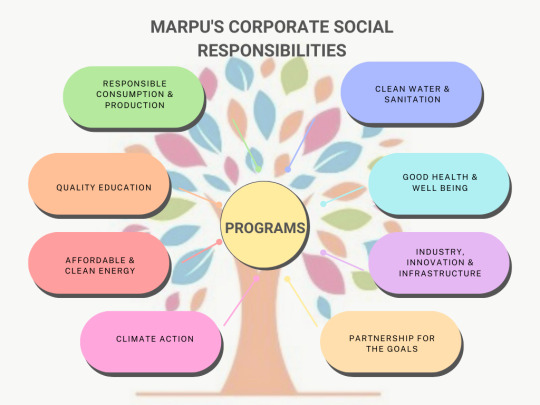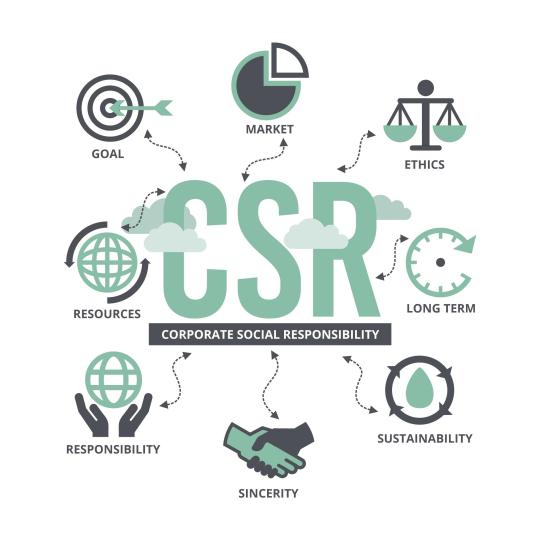#corporate environmental responsibilities
Explore tagged Tumblr posts
Text
How Climate Change Initiatives are Shaping Employee Benefits?
Growing concerns about climate change are no longer limited to environmental discussions. They are now influencing workplace policies and employee benefits. Continue reading How Climate Change Initiatives are Shaping Employee Benefits?
0 notes
Text

#free congo#don't forget about the congo#tesla#glencore#cobalt#nickel#human rights abuses#allegations#mining industry#renewable energy#clean energy#environmental impact#worker mistreatment#corruption#ethical sourcing#global supply chain#corporate responsibility#renewable energy transition#accountability
343 notes
·
View notes
Text
Uniphos Enterprises Limited Releases Business Responsibility and Sustainability Report for FY 2023-24
UEL is a leading player in trading in chemicals and agro-commodities. It has released its Business Responsibility and Sustainability Report (BRSR) for the fiscal year 2023-24. The report, presented in conformity with SEBI’s Listing Obligations and Disclosure Requirements Regulations, 2015, reflects the company’s initiative regarding ethical governance, environmental care, and social responsibility.
Overview: In an era where corporate accountability runs parallel, UEL’s BRSR 2023-24 reflects the commitment of UEL towards sustainability and responsible business behavior. The report epitomizes salient features of the company’s operations, best governance practices, and environmental impact, focusing on core values related to excellence, integrity, respect, and collaboration.
Body UEL was incorporated in 1969 and is essentially a trading company. A large portion of the turnover consists of trading in chemicals and agro commodities. For FY 2023–24, revenue from trading operations contributed 54.16%, while income from investments in equity shares and mutual funds contributed 42.26% of revenue.
The company is headquartered in Mumbai with regional offices based in Gujarat. Its staff is on deputation, with only a small number being UEL recruits; it has taken important steps in maintaining gender diversity—one-third of the members on the Board of Directors comprise women.
The report enumerates corporate governance practices in which UEL has also ensured the whistleblower policy to get grievances over and above transparency. UEL further states its due compliance with regulatory requirements, as amply evidenced by the reaction of the company to a minor delay in the regulatory filings for which the waiver of the fine was sought from stock exchanges.
Although UEL is not a manufacturing company, the report reflects the concern of the company regarding environmental sustainability. The environmental impact of UEL is very minimal, as the company consumes limited amounts of energy only and does not produce much waste that is considered harmful to the environment. The sustainability practice at UEL is mainly limited to ensuring full compliance with environmental laws and regulations, and operations are performed in a manner to ensure no adverse impact on the environment.
From the viewpoint of social responsibility, the activities of UEL are restricted to its scale of operation; however, the company maintains a conducive and non-threatening workplace. It is pointed out in the report that UEL follows the Rights of Persons with Disabilities Act, 2016, providing accessibility in offices and non-discrimination in employment.
UEL’s commitment to doing good business is further reflected in its anti-bribery and anti-corruption policies, although the company has not adopted a stand-alone anti-corruption policy; rather, the principles are encapsulated within its general code of conduct meant for all employees and major vendors.
Overview The Business Responsibility and Sustainability Report for FY 2023-24 underlines the commitment of Uniphos Enterprises Limited to promote the gold standard in corporate governance, care for the environment, and observe social responsibility. Though the operation of the company remains limited within the scope mentioned, its commitment remains toward responsible business practices. While moving forward with challenges in the modern business landscape, UEL remains focused on aspects related to sustainability, transparency, and ethical conduct and sets a good example for such categories of companies.
Source: BRSR Credit: Uniphos Enterprises Limited
#Business Ethics#Corporate Governance#Corporate Responsibility#Environmental stewardship#ESG#Sustainability Report#Sustainable Business
2 notes
·
View notes
Text

Maximizing the impact of Corporate Social Responsibility: A Partnership with Marpu Foundation
Uniting Corporate Social Responsibility and Sustainability Goals for a Sustainable Future In the landscape of modern business, combining Corporate Social Responsibility (CSR) and Sustainability Goals (SDG) is not just a trend, but a strategic one necessity. The Marpu Foundation, with its innovative approach to sustainable development, is a beacon for companies that are trying to strengthen the impact of their social responsibility.
The Synergy Between Corporate Social Responsibility and Sustainable Development Goals
CSR initiatives are no longer limited to charity; they are strategic business needs that align with the broader goals of Sustainable Development. The synergy of social responsibility and sustainability goals is based on their shared vision of a sustainable future. Corporate Social Responsibility is a means by which companies can contribute to the global agenda of the Sustainable Development Goals, which encompasses a range of goals from poverty alleviation to environmental protection.
Marpu Foundation's Unique Approach
Marpu Foundation has created a niche market for CSR by adopting an empathetic approach to sustainability. Their mission is to harness the human potential for positive change and adhere to several Sustainable Development Goals, including clean water and sanitation, affordable and clean energy and quality education.

Success Stories That Inspire
Marpu Foundation's success stories are proof of its effective model. They were recognized at the 2022 NGO Awards as "NGO of the Year - Power Environment", underscoring their commitment to environmental protection and sustainability. More than 12 million volunteers participated in their projects, demonstrating the power of collective action to achieve the goals of sustainable development.
Impact of Collaboration
The collaboration between companies and the Marpu Foundation can lead to impressive CSR initiatives that not only meet the company's goals, but also significantly contribute to the achievement of sustainability goals. Marpu's broad reach and strong partnerships enable them to meet various CSR goals, meaningfully engage employees and create value for all stakeholders.
Conclusion: Crafting a Sustainable Legacy Partnering with the Marpu Foundation offers companies the opportunity to be part of the change. By connecting CSR with the Sustainable Development Goals, companies can create a legacy of sustainability that resonates with consumers, investors and communities alike. It's time to embrace this synergy and make a lasting impact on our world.
Always Remember that, “We make a living by what we get, But we make our life by what we give”
To learn more about how your company can partner with the Marpu Foundation, visit their website or follow their social media channels for the latest updates and success stories.
#marpu foundation#corporate social responsibility#sustainable living#ngoindia#environmental activism
2 notes
·
View notes
Text
Qmines Limited on the way to become Australia's Next Copper and Gold Mining Powerhouse under the leadership of Andrew Sparke
In the dynamic world of mining, where visionaries are essential for success, Andrew Sparke stands out as a remarkable leader driving Australia's copper and gold mining industry to new heights. As the Managing Director of QMines Limited, Andrew Sparke is spearheading the charge towards transforming his company into a true powerhouse within the sector. This article delves into the exceptional qualities and achievements of Andrew Sparke, highlighting his key role in propelling QMines to the forefront of the industry.
Leading the Way with QMines Limited:
Under Andrew Sparke's capable guidance, QMines Limited has emerged as a leading player in Australia's mining landscape. With a focus on exploring and developing copper and gold projects, QMines has set its sights on becoming a dominant force in these lucrative markets. Andrew Sparke's strategic vision and unwavering commitment to excellence have propelled the company's growth and attracted significant attention from investors and industry experts alike.
Expertise and Experience:
Andrew Sparke brings a wealth of expertise and experience to the table, making him an invaluable asset to QMines Limited. With a distinguished background in corporate finance and extensive knowledge of the mining sector, Sparke has a deep understanding of the intricate workings and challenges of the industry. His ability to navigate complex landscapes and capitalize on opportunities has been instrumental in driving QMines towards its ambitious goals.
A Visionary Leader:
At the heart of Andrew Sparke's success is his visionary leadership style. He possesses an innate ability to identify and seize upon promising mining projects, ensuring QMines remains at the forefront of the market. With an eye for detail and a strategic mindset, Sparke steers the company towards sustainable growth and profitability, while maintaining a strong focus on environmental and social responsibility.
Driving Innovation and Sustainability:
Andrew Sparke recognizes that success in the mining industry is not only measured by financial gains but also by the company's commitment to sustainability and responsible practices. Under his stewardship, QMines Limited actively invests in innovative technologies and sustainable mining practices, ensuring the preservation of the environment and the well-being of local communities.
Andrew Sparke's remarkable journey as the Managing Director of QMines Limited showcases his exceptional leadership qualities, strategic vision, and commitment to driving Australia's copper and gold mining industry forward. With his expertise and unwavering dedication, Sparke is shaping QMines into a formidable force within the sector. As the company continues to flourish, underpinned by innovation and sustainability, Andrew Sparke's legacy as a visionary leader will be etched in the annals of Australia's mining history.
#Andrew Sparke#Visionary leader#Australia#Copper mining#Gold mining#QMines Limited#Managing Director#Mining industry#Strategic vision#Expertise#Growth#Investors#Industry experts#Corporate finance#Mining sector#Leadership#Sustainable growth#Profitability#Environmental responsibility#Social responsibility#Innovation#Sustainability#Responsible practices#Preservation#Local communities.
2 notes
·
View notes
Text
#Tags:Cheap Labor Costs#Child Labor#Corporate Social Responsibility#Environmental Impact#Ethical Consumerism#facts#Fair Trade#Fast Fashion#Forced Labor#Global Supply Chain#Human Rights#Labor Exploitation#Labor Laws#life#Modern Slavery#Podcast#serious#straight forward#truth#upfront#website#Worker Rights#Worker Safety
0 notes
Text
The Harmful Impacts of the Profit Motive on Society
The profit motive, while often driving innovation and economic growth, can harm society in various ways when it is prioritized over ethical and social considerations. Here’s how the unchecked profit motive can have negative impacts:
1. Exploitation of Workers and Resources
Labor Exploitation: When profit becomes the main objective, companies may underpay workers, push excessive hours, or disregard workplace safety to cut costs, leading to poor working conditions, low wages, and limited job security.
Environmental Degradation: To minimize costs, profit-driven industries may exploit natural resources unsustainably, leading to deforestation, pollution, and a significant ecological footprint that can harm biodiversity and human health.
2. Compromised Product and Service Quality
Reduced Quality and Safety: The focus on profit often leads companies to reduce product quality, cut corners, or neglect safety standards to reduce expenses. This can lead to consumer harm, such as when products are hazardous, or healthcare services are inadequate.
Planned Obsolescence: Many companies design products with a limited lifespan to ensure repeat purchases, resulting in waste and forcing consumers to spend more frequently to replace items.
3. Increased Inequality
Wealth Concentration: The profit motive often drives wealth to those at the top, leading to income inequality. Wealthy individuals and corporations have more economic and political influence, which can marginalize the needs of lower-income populations.
Limited Access to Basic Services: When essential services, such as healthcare, education, and housing, are profit-driven, they may become unaffordable or inaccessible to those in need, exacerbating social inequality.
4. Erosion of Social Values
Undermining Public Interest: When companies and industries prioritize profit over public welfare, they may lobby against regulations designed to protect the public, such as environmental protections or labor laws, which can harm society at large.
Consumerism and Materialism: The profit motive fuels consumerism, encouraging people to equate happiness and success with material possessions. This can erode values like community, sustainability, and personal fulfillment, leading to overconsumption and societal discontent.
5. Health Risks and Misinformation
Unethical Marketing Practices: Companies may exploit consumer vulnerabilities to boost sales, promoting unhealthy foods, addictive products, or misleading information to maximize profit. This can contribute to public health crises, such as obesity, addiction, and misinformation.
Healthcare Disparities: In profit-driven healthcare systems, medical decisions may prioritize financial incentives over patient care, leading to unnecessary treatments, inflated costs, or a lack of care for those unable to pay, worsening health disparities.
6. Weakening of Democracy
Political Influence and Lobbying: Profit-driven entities often use wealth to influence legislation and policies that favor corporate interests over public good, which can lead to deregulation, tax benefits, and weakened accountability.
Reduced Government Revenue: When corporations avoid taxes or lobby for lower tax rates, it reduces government revenue, limiting funds available for public services like education, infrastructure, and social safety nets that benefit society as a whole.
7. Environmental and Climate Harm
Climate Change Acceleration: Profit-driven industries often prioritize short-term gains over long-term environmental sustainability. Fossil fuel companies, for example, may prioritize profit despite the known consequences of climate change, worsening environmental challenges for future generations.
Resource Scarcity: Unsustainable profit-focused practices, such as overfishing, deforestation, and pollution, deplete natural resources and harm ecosystems, making it harder for future generations to sustain their way of life.
While profit can drive innovation and economic growth, an unregulated profit motive can lead to exploitation, environmental harm, inequality, and a decline in public welfare. Balancing the profit motive with ethical considerations and social responsibility is essential for creating a sustainable and equitable society that prioritizes both economic prosperity and the common good.
#philosophy#epistemology#knowledge#learning#education#chatgpt#ethics#psychology#economics#politics#sociology#Profit Motive#Social Inequality#Environmental Impact#Labor Exploitation#Consumerism and Materialism#Healthcare and Profit#Economic Inequality#Political Influence of Corporations#Ethical Business Practices#Public Welfare#Social Impact of Capitalism#Wealth Inequality#Environmental Sustainability#Economic Ethics#Public Welfare vs. Private Profit#Corporate Influence on Policy#Social Responsibility
1 note
·
View note
Text
Why CSR Matters: A Commitment to Society and Sustainability
Corporate Social Responsibility (CSR) is much more than a compliance measure—it’s a moral and strategic commitment that reflects a company’s dedication to the well-being of society and the environment. By aligning business goals with the broader purpose of contributing positively to the communities they depend on, companies can create a lasting impact and foster trust among stakeholders.

#Corporate responsibility#Sustainable development#Corporate social responsibility (CSR)#Sustainability#Corporate sustainability programs#CSR and sustainability#CSR and sustainable development#CSR for climate change#CSR for environmental sustainability#CSR strategies for sustainable business growth#CSR sustainability practices#CSR sustainability strategy#Environmental impact of CSR#Environmental sustainability through CSR activities#Importance of sustainability in CSR initiatives#Social sustainability in CSR#Sustainability and corporate governance#Sustainability in CSR#Sustainable business practices#Sustainable CSR initiatives#Sustainable Development Goals (SDGs)
0 notes
Text
Steps to perform an effective CSR strategy

CSR, or corporate social responsibility, is becoming a key component of profitable business operations. As consumers increasingly prefer brands that demonstrate social and environmental accountability, companies must implement effective CSR event strategies to drive positive change while enhancing their brand reputation. This article outlines actionable steps for implementing effective CSR event strategies that align with your company’s values and objectives.
1. Define Your CSR Objectives
Before implementing any CSR event initiatives, it’s crucial to define clear objectives. Identify what social, environmental, or economic issues resonate most with your stakeholders and align with your business goals. This could involve focusing on areas such as community development, environmental sustainability, or employee welfare.
For instance, if your company values health and wellness, you might consider organizing health camps or blood donation camps to address local health needs.
2. Engage Stakeholders
Involve your employees, customers, investors, and community members in the planning process. Conduct surveys or hold meetings to understand their perspectives and expectations regarding CSR. Engaging stakeholders not only enhances buy-in for your initiatives but also helps identify the most pressing needs within the community.
3. Research and Benchmark
Look at successful CSR event strategies implemented by other organizations, particularly those in your industry. Analyze their programs to identify best practices and lessons learned. Benchmarking against industry leaders can help you craft innovative strategies tailored to your business model.
4. Develop a Comprehensive CSR Policy
Create a formal CSR policy that outlines your commitment to social responsibility, the specific areas you will focus on, and the strategies you plan to implement. Ensure that this policy aligns with your company’s mission and values, and make it accessible to all stakeholders.
5. Choose Appropriate CSR Activities
Select CSR event activities that reflect your company’s strengths and address community needs. Here are some effective options:
Blood Donation Camps: Partner with local blood banks to organize blood donation drives. This can significantly impact public health and showcase your commitment to community welfare.
Charity Fundraisers: Host events that raise funds for local charities or causes that resonate with your stakeholders. Engaging employees in planning and execution can also foster team spirit.
Health Camps: Collaborate with healthcare providers to offer free health camps for check-ups and consultations to underserved populations.
Community Sports Events: Organize sports activities that promote teamwork and physical health while building connections within the community.
6. Allocate Resources Wisely
Ensure that you allocate sufficient resources, including funding, personnel, and time, to support your CSR event initiatives. This may involve setting a dedicated budget for CSR activities and assigning team members to manage the implementation and monitoring of these initiatives.
7. Promote Internal Engagement
Encourage employee involvement in CSR event initiatives to enhance morale and foster a culture of social responsibility. Offer volunteer opportunities, encourage participation in community sports events, and recognize employees’ contributions to CSR event efforts. This not only strengthens team bonds but also aligns employee values with the company's mission.
8. Implement Effective Communication Strategies
Communicate your CSR event initiatives to all stakeholders. Use social media, newsletters, and your company website to share your CSR activities and their impact on the community. Transparency is key regular updates on your progress and outcomes will build trust and credibility.
9. Measure and Evaluate Impact
To ensure the effectiveness of your CSR strategies, establish metrics to evaluate the impact of your initiatives. Collect data on community engagement, employee participation, and social outcomes. This information will help you assess the success of your CSR event programs and identify areas for improvement.
10. Continuously Improve and Adapt
CSR event is not a one-time effort; it requires ongoing commitment and adaptation. Use the feedback and data collected from your evaluations to refine your CSR event strategies. Stay informed about emerging social and environmental issues, and adjust your initiatives accordingly to remain relevant and effective.
Advantages of Social Responsibility
Enhanced Brand Reputation: Businesses that engage in CSR event can build a positive reputation, attracting customers who value ethical practices.
Increased Customer Loyalty: Consumers are more likely to support companies that align with their values and contribute to social good.
Attracting Talent: A strong CSR event commitment can help attract top talent, especially among younger generations who prioritize working for socially responsible companies.
Improved Employee Morale: Employees who see their company actively contributing to society are often more motivated and engaged.
Long-Term Profitability: Companies with effective CSR event strategies can achieve long-term financial success by reducing risks and attracting loyal customers.
Disadvantages of Social Responsibility
Increased Costs: Implementing CSR event initiatives can be expensive, particularly for small businesses that may lack the resources to sustain them.
Resource Allocation: Time and resources spent on CSR events might detract from core business activities or immediate financial performance.
Possible Greenwashing: Companies may engage in superficial CSR efforts to appear socially responsible without making genuine contributions, leading to potential backlash.
Short-Term Focus: Stakeholders may prioritize immediate financial returns over long-term social investments, creating tension in corporate decision-making.
Complexity of Implementation: Developing and executing effective CSR event strategies can be complicated and require specialized knowledge, making it challenging for some companies.
Conclusion
Implementing effective CSR event strategies is essential for businesses looking to make a meaningful impact on their communities while enhancing their brand reputation. By defining clear objectives, engaging stakeholders, and selecting appropriate activities such as blood donation camps, charity fundraisers, and health camps, companies can drive positive change and foster loyalty among customers and employees alike. Collaborating with an Event Management Agency can further streamline the planning and execution of these initiatives, ensuring that they are successful and resonate with the community.
Remember, the key to a successful CSR event lies in continuous improvement and alignment with your company’s core values. Embrace social responsibility as an integral part of your business strategy, and you’ll pave the way for sustainable success.
#event management#CSR event#corporate social responsibility#healthcare#CSR event strategy#Philanthropic responsibility#Environmental responsibility#Ethical responsibility#Economic responsibility#community sports events#health camps#blood donation camps.
1 note
·
View note
Text

#petrochemical industry#plastic waste#recycling#environmental impact#public health crisis#fossil fuel companies#deception#corporate responsibility#environmental justice#pollution#plastic pollution#recycling limitations#economic factors#health risks#plastic recycling#public relations#lobbying efforts#recycling promotion#industry front groups#corporate strategies#circular economy#recycling research#environmental education#corporate awareness#sustainability claims
13 notes
·
View notes
Text
Beyond the Gold Rush: Barrick Gold's Ethical Predicament
by: Alejandro, Amank, Aubrey, Edwin, Shardul, Shruti
Company Overview Known for its diversified collection of gold and copper assets, Barrick Gold operates in 13 countries and owns 16 active sites. It was founded by Peter Munk who made it a global mining giant. Its production history is quite impressive while its market value is close to CAD$40 billion thus making it one of the kings of the game. Notwithstanding these achievements; however, Barrick Gold has encountered great moral, human rights and legal problems which has led to its bad name.
Ethical, Human Rights, and Legal Challenges
Though Barrick Gold professes to abide by lofty ethical principles, it has been engaged in various disputes over contraventions of human rights and degradation of the environment, especially within the bounds of Papua New Guinea and Tanzania. The corporation’s Porgera Joint Venture mine has faced challenges accusing it of employing too much violence towards surrounding populations and causing significant harm to nature. Furthermore, Barrick Gold has also been charged with polluting water bodies and invading animal territories. Such claims have raised doubts regarding its true commitment towards sustainable mining operations hence resulting into a host of lawsuits in addition to public investigations.
PESTEL Analysis
To gain a deeper understanding of the external factors influencing Barrick Gold's operations, a PESTEL analysis is essential:
Political: In nations where Barrick Gold operates, political instability has the potential to introduce unpredictability and impede the company’s operations. For instance, the company’s past encounter with challenges attributed to government regulations and taxation in Tanzania indicates that political landscapes should be navigated with care. Economic: Barrick Gold’s profitability can significantly be affected by economic factors such as exchange rate fluctuations and prices for commodities. Therefore, it is important for the company to mitigate the effects of economic risks in order to adapt well to changing market scenarios that will enable it survive at long-term. Social: Social issues are critical in Barrick Gold´s operations like community relations or indigenous rights. The firm must balance between its economic goals and the fulfillment of its social obligations with regard to respect as well as collaboration when dealing with local communities. Technological: Enhancements in technology can help an organization increase its effectiveness and productivity in the mining sector. Barrick Gold has invested more funds into technology to boost its profitability while minimizing adverse ecological effects. Nonetheless, the firm must be aware of such issues as job losses due to automation or other adverse effects on neighboring communities that may arise from new technologies. Environmental: The mining sector faces numerous challenges due to serious environmental problems including climate change, water shortage and extinction of species. To ensure that it survives for long; Barrick Gold should adopt sustainable methods so as reduce its impact on environment. Legal: The operations of Barrick Gold can be fundamentally affected by legal regulations on mining, environmental protection and human rights. For this reason, it needs to observe the law in order to avoid any legal proceedings and build a good image.
Conclusion Barrick Gold Corporation is in a difficult position trying to balance between making money and being responsible. They earned a good sum of money anyhow they also face different problems such as human rights abuses, ethical and lawful problems arisen from their operations. Another strategy which can help Barrick Gold in minimizing reputational risks and boosting trust among its partners is enhancing responsible corporate conduct through more engagement of stakeholders and sustainable development initiatives.

#Barrick Gold#PESTL Analysis#MBA Ethics#business strategy#Corporate Social Responsibility#CSR#mining industry#environmental impact#ethical business practices#Political Risk#Global Economics#sustainability#ethical decision making
1 note
·
View note
Text
Tata Steel UISL Inaugurates Two Sewage Pumping Stations in Jamshedpur
New facilities in Patel Nagar and Jai Prabha Complex expand service coverage to 60% Tata Steel UISL has launched two advanced Sewage Pumping Stations in Jamshedpur, boosting the city’s wastewater management capabilities. JAMSHEDPUR – Tata Steel UISL has inaugurated two state-of-the-art Sewage Pumping Stations in Patel Nagar, Bhuiyadih and Jai Prabha Complex, Kadma, significantly enhancing…
#बिजनेस#business#Chanakya Chaudhary Tata Steel#corporate social responsibility#environmental sustainability initiatives#Jamshedpur urban planning#sanitation services expansion#Sewage Pumping Stations Jamshedpur#sustainable city development#Tata Steel UISL#urban infrastructure development#Wastewater Management
0 notes
Text
Fidelity Bank Partners Lagos State to Plant 20,000 Trees
As part of initiatives under its Environment Corporate Social Responsibility (CSR) pillar, leading financial institution, Fidelity Bank Plc, has partnered with the Lagos State Parks and Gardens Agency (LASPARK) to launch a tree planting drive. Through the collaboration, Fidelity Bank will support LASPARK to plant 20,000 trees in the state by July 2025 as part of its strategy to combat climate…
#- Environmental Sustainability#climate change action#Corporate Social Responsibility#Fidelity Bank CSR#green initiatives#Lagos State Government#LASPARK partnership#Nigerian Conservation Foundation#Touchaheart.com.ng#tree planting initiative#UN Sustainable Development Goal 13
0 notes
Text
Oh, any reference to that study makes me sooo mad. People seem to think these companies are just burning fossil fuels in their backyard for fun, rather than those fossil fuels being used in our everyday lives.
I think one other thing to remember is that when the systematic change comes through, that will have an effect on how we are living our lives.
The way that we are currently living our life - the way we heat and air-condition our houses, how frequently we are in our cars or flying somewhere by plane, the amount of meat and dairy products we produce, when and where we buy our clothes and our phones and our food, and how much we consume year in, year-out - will have to be different in the future.
How we are living our lives now cannot continue, it is not sustainable, and any systemic change that y'all are waiting for will change it drastically.
So why not change it now? Before your hand is forced? Is there really no change you can enact that would be in line with such a sustainable future?
Denying the role that individuals need to play in combating the climate crisis is the leftist version of climate change denial. Anyone responding to suggestions of realistic, accessible changes to reduce your own impact with anything resembling ‘100 companies are responsible for most of our emissions so this is pointless’ are engaging in science denialism.
There is no way that collective action takes place without individuals making changes in their own lives. Yes, the rich are more responsible than the poor and yes, what we need is systematic change. However, there absolutely are things we can and should be doing to reduce our own impact and put pressure on polluting industries through direct action and boycott.
These include stopping or reducing flying, eliminating or drastically reducing our consumption of meat and dairy, buying second hand where possible, repairing, recycling and supporting environmental action and rewilding efforts. None of this in isolation will mend the world but its a hell of a lot better than passing the buck while refusing to make any changes in our own lives.
I know that the idea that climate change is caused by someone else; somewhere else, and that it’s up to them to change instead of us is seductive rhetoric, but it’s also extremely dangerous. It encourages the kind of apathy that plays directly into the hands of corporations who want us to feel powerless and to continue to consume as we do now.
We can’t just sit around and wait for The Revolution; we have to live revolutionary lives.
#environmentalism#climate crisis#fossil fuels#it doesn't have to be cold turkey#i have been changing my life to be in line with my values for over a decade#and I'm still working on it#it's a never-ending project#just start#take responsibility#and stop soothing yourself with stories of big corporations as if the way you are living is not being served by them in the first place
2K notes
·
View notes
Text
Values In Action: Sustainability In Tech

The Green Blueprint: Integrating Sustainability into Core Corporate Values
In an era where climate change and environmental conservation are at the forefront of public consciousness, businesses are increasingly called upon to take a stand, and as the 19th-century German novelist Jean-Paul Richter aptly said, "Do not wait for extraordinary circumstances to do good action; try to use ordinary situations."
In today's corporate world, integrating sustainability into core values is crucial for long-term viability and ethical responsibility. Research shows that sustainable practices significantly influence consumer preferences and investment decisions, driving consumer loyalty and business success.
Businesses that adapt to this shift contribute to the planet's health and ensure their own sustainable growth in the marketplace. By prioritizing sustainability in business, companies can achieve long-term success while also benefiting the environment.
The Current State of Corporate Sustainability
Global Trends and Statistics
The corporate world has witnessed a significant pivot towards sustainability over the past decade. This transformation is supported by compelling statistics that illustrate the growing importance of sustainable practices within business strategies globally:
Business Strategy and Executive Support
A World Economic Forum report reveals that 75% of senior executives now see sustainability as essential to their business strategy, driven by ethics and financial performance. This reflects a shift from sustainability as a secondary concern to a central strategic element.
Consumer Preferences
A Nielsen study shows that two-thirds of global consumers prefer companies that align with their values, particularly regarding environmental responsibility. This indicates a significant consumer shift toward supporting sustainable businesses.
Industry Leaders in Sustainability
The renewable energy sector and major tech companies lead in sustainability, revolutionizing energy use and reducing carbon footprints. The fashion industry is also adopting sustainability through initiatives like fabric recycling and water reduction.
Challenges to Implementation
Companies face challenges such as high initial costs, complex supply chain changes, and balancing profitability with environmental goals in fully integrating sustainability.
These emerging trends and ongoing challenges illustrate the complex landscape of corporate sustainability today. As companies navigate this terrain, integrating sustainable practices into their core operations and values becomes beneficial and imperative for their survival and growth in the 21st-century marketplace.
Why Integrate Sustainability?
The imperative for integrating sustainability into corporate values extends beyond mere regulatory compliance or public relations. It is a strategic necessity that impacts various facets of a business, from economic viability to social and environmental responsibility.
Economic Benefits
Research shows that robust sustainability practices boost market value and investor attractiveness, with companies like those in an MIT study reporting a 38% revenue increase. Sustainable practices also reduce operational costs by up to 30%, enhancing profitability and stability.
Social Impact
Sustainability enhances a company's reputation and brand value, with 66% of consumers willing to pay more for sustainable products. Companies engaged in sustainability report higher employee satisfaction and retention rates.
Environmental Responsibility
Businesses adopting sustainable practices significantly reduce carbon footprints and conserve resources, aiding in the fight against climate change. This ensures compliance with environmental regulations and appeals to eco-conscious consumers and stakeholders.
Integrating sustainability into core values ensures long-term viability, benefiting the planet and society while providing a competitive edge. This approach aligns with the growing market norm of prioritizing sustainability.
How to Integrate Sustainability into Core Values
Integrating sustainability into a company's core values involves strategic planning, committed leadership, and a company-wide cultural shift. This section outlines actionable steps and strategies to effectively embed sustainability into the fabric of an organization.
Leadership Commitment
Leadership must actively drive sustainability by setting clear goals and integrating them into the corporate mission. Demonstrating commitment through personal involvement and strategic planning is essential.
Employee Engagement
Every employee must understand and participate in sustainability efforts, achieved through comprehensive training and platforms for contributing ideas. This fosters ownership and engagement across the organization.
Policy and Practice Integration
Revise business practices and policies to align with sustainability goals, such as prioritizing sustainable suppliers and aiming for energy efficiency. Each department should have specific sustainability objectives.
Innovation and Adaptation
Invest in R&D for sustainable solutions that address environmental concerns and meet evolving consumer needs. Companies must adapt strategies to keep pace with technological advancements and regulatory changes.
Building Partnerships
Form partnerships with businesses, non-profits, and government agencies to amplify sustainability efforts. These collaborations offer resources, shared expertise, and increased credibility.
Monitoring and Reporting
Establish mechanisms to monitor progress and report on sustainability, including regular reviews and public reporting. Transparent reporting builds trust and demonstrates commitment to sustainability goals.
By following these steps, companies can ensure that sustainability becomes a core part of their identity, influencing every decision and action. This integration benefits the company and its stakeholders and contributes to the broader global effort towards sustainable development.
Our Journey Towards Sustainability
In the tech industry, sustainability is essential. At Coditude, it drives our operations, product development, and community interactions, reflecting our commitment to environmental and societal impact.
Our Commitment to Sustainability
Our dedication to sustainability is demonstrated through comprehensive strategies and practices that permeate every aspect of our operations:
Sustainable Product Development: We develop software that meets high-efficiency standards and minimizes environmental impact by optimizing code and incorporating sustainable practices throughout the development lifecycle.
Green Operations: We reduce waste, enhance energy efficiency, and promote recycling in our offices, minimizing our ecological footprint and setting a standard for employees and partners.
Community Engagement: We sponsor and participate in local environmental initiatives, fostering a broader culture of sustainability that extends beyond our corporate boundaries.
Transparent Stakeholder Engagement: We maintain transparency with stakeholders by regularly sharing updates on our sustainability efforts, reinforcing our commitment, and encouraging accountability.
The Broader Impact and Our Role
We aim to inspire the tech industry by demonstrating that sustainable practices can coexist with innovation and profitability. The tech sector can significantly influence global environmental outcomes, and we are proud to lead by example.
Embracing Challenges and Seizing Opportunities
Integrating sustainability poses challenges like costs and cultural shifts but offers opportunities to innovate in green technology, attract sustainability-focused customers, and stand out in a competitive market.
Bringing Company Values to Life Through Employee Engagement and Sustainability Efforts
Promoting company values starts with leadership engagement, where leaders exemplify these values in behavior and decision-making, creating a trickle-down effect throughout the organization.
Companies like Patagonia and LEGO embed sustainability into their core strategies, reinforcing values of environmental stewardship and innovation through sustainable business practices.
Recognition reinforces company values by celebrating employees who demonstrate them. Platforms like Workvivo facilitate peer shout-outs and engagement, fostering appreciation and mutual respect.
Integrate sustainability into company values by adopting green technologies, recycling programs, and community projects, enhancing reputation and aligning with global sustainability goals.
Conclusion and Future Outlook
As businesses continue to navigate the complexities of the modern world, integrating sustainability into their core values is not just a trend but a necessity. This journey towards sustainable business practices demands a robust commitment from leadership, active employee participation, and a culture that celebrates these values.
Summarization of Key Points
Integrating sustainability involves adopting environmentally friendly practices while addressing economic, social, and ethical dimensions. Companies like Nike and Apple show that these values enhance brand loyalty and trust.
Challenges and Considerations
Integrating sustainability requires adapting to changing standards, consumer expectations, and ensuring transparency. Initial costs and organizational adjustments can be significant.
Future Directions
The importance of sustainability in business will increase with global challenges like climate change. Companies must innovate with sustainable technologies and supply chains to thrive and maintain a competitive advantage.
Let's shape a greener world together
As Coditude continues to lead by example in integrating sustainability into our core values, we invite other companies, stakeholders, and individuals interested in learning more about our initiatives or seeking guidance on implementing similar practices to reach out.
#environmental sustainability#green technology#importance of sustainable development#environment and sustainability#sustainability in business#corporate sustainability#sustainable technology#sustainable technology solutions#environmental responsibility
0 notes
Text
ESG 行銷在香港企業界的影響

近年來,環境、社會和治理(ESG)的概念已成為全球企業關注的焦點,香港也不例外。隨著企業和投資者越來越認識到可持續和負責任的實踐的重要性,ESG 行銷已成為提升企業聲譽和推動業務增長的重要工具。但是,ESG 行銷在香港的企業界真的有影響嗎?公司如何利用 ESG 行動獲得競爭優勢,這對其整體成功有何影響?
ESG 在香港的重要性不斷提升
由於多種因素,包括監管變革、投資者需求和社會期望,香港的 ESG 重要性顯著提升。香港交易及結算所有限公司(HKEX)實施了嚴格的 ESG 報告要求,要求上市公司披露其環境、社會和治理實踐。這些法規旨在促進企業部門的透明度、問責制和可持續性。
此外,投資者在投資決策中越來越重視 ESG 因素,認識到具有強大 ESG 表現的公司更能管理風險並抓住機會。這種投資者行為的轉變促使許多公司加強其 ESG 行動,並通過 ESG 行銷有效地傳達這些努力。
ESG 行銷的角色

ESG 行銷涉及向投資者、顧客、員工和社區等利益相關者推廣公司的 ESG 行動。有效的 ESG 行銷可以幫助公司建立信任,提升其聲譽,並在競爭中脫穎而出。以下是 ESG 行銷在香港企業界帶來影響的方式:
建立信任和可信度:
透明地傳達 ESG 努力的公司更容易贏得利益相關者的信任。例如,一家公司如果強調其減少碳排放、支持本地社區和確保倫理治理的承諾,就可以建立積極形象並建立可信度。這種信任對吸引和留住顧客、投資者和人才至關重要。
吸引投資:
投資者越來越尋找具有強大 ESG 資質的公司。有效的 ESG 行銷可以突顯公司的可持續實踐和長期價值主張,使其對 ESG 專注的投資者更具吸引力。通過展示其可持續性的承諾,公司可以接觸更廣泛的資金來源並提高估值。
增強顧客忠誠度:
香港及全球的消費者越來越關注其購買行為的環境和社會影響。有效地行銷其 ESG 行動的公司可以區分自己並吸引優先考慮可持續性的顧客。例如,一家推廣其使用環保材料和公平勞動實踐的時裝品牌,可以吸引道德消費者。
改善員工參與度:
員工越來越希望為與其價值觀一致的公司工作。有效的 ESG 行銷可以通過展示公司對產生積極影響的承諾來提高員工士氣並吸引頂尖人才。例如,一家科技公司強調其減少碳足跡和促進多樣性和包容性的行動,可以創造一個更有動力和忠誠的工作團隊。
案例分析:香港的 ESG 行銷成功
幾家公司在香港成功利用 ESG 行銷來提升其聲譽並推動業務增長。以下是一些例子:
太古地產(Swire Properties): 太古地產在可持續發展方面一直是領導者,其行動集中於能效、綠建築認證和社區參與。通過有效的 ESG 行銷,該公司傳達了其可持續成就,贏得了利益相關者的認可和信任。
中電控股(CLP Holdings): 作為主要能源公司,中電控股強調其向低碳經濟過渡的承諾。該公司的 ESG 行銷努力突顯了其在可再生能源和創新技術方面的投資,使其成為能源行業的前瞻性領導者。
滙豐(HSBC): 滙豐將 ESG 因素整合到其業務策略和投資決策中。通過推廣其可持續金融行動和支持綠色項目,滙豐加強了其作為負責金融機構的品牌。
ESG 行銷的挑戰
儘管 ESG 行銷帶來諸多好處,但也存在挑戰。公司必須確保其 ESG 聲明可信且有實際行動支撐。綠色洗白(greenwashing)——即公司誇大或偽造其 ESG 努力——可能損害聲譽並侵蝕信任。因此,透明度和真實性對於 ESG 行銷至關重要。
此外,公司必須跟上不斷變化的 ESG 標準和法規。聘請 ESG 顧問(ESG 顧問)可以幫助公司制定健全的 ESG 策略並有效地傳達其努力。ESG 顧問提供有價值的見解和指導,確保公司的 ESG 行動符合最佳實踐和利益相關者的期望。
精英亞洲的全面 ESG 行銷服務

精英亞洲(Elite Asia)可以幫助您提供全面的 ESG 行銷服務,從 ESG 行銷策略、品牌知名度、ESG 品牌訊息、ESG 活動推廣等方面,協助您的公司在這一領域取得成功。
結論
ESG 行銷對香港的企業界產生了重大影響。通過有效地傳達其 ESG 行動,公司可以建立信任,吸引投資,增強顧客忠誠度,並改善員工參與度。然而,成功的 ESG 行銷需要真實性、透明度和對可持續性的真正承諾。隨著 ESG 重要性的持續提升,香港的公司必須利用 ESG 行銷來應對不斷變化的環境,實現長期成功。您的公司準備好利用 ESG 行銷的力量來產生影響嗎?邁向可持續未來的旅程始於對負責任實踐和有效溝通的承諾。
#ESG marketing#Hong Kong corporate landscape#ESG initiatives#sustainable business#environmental responsibility#social responsibility#governance practices#ESG compliance#ESG 顧問#ESG strategy#brand awareness#ethical business#low-carbon economy#renewable energy
0 notes